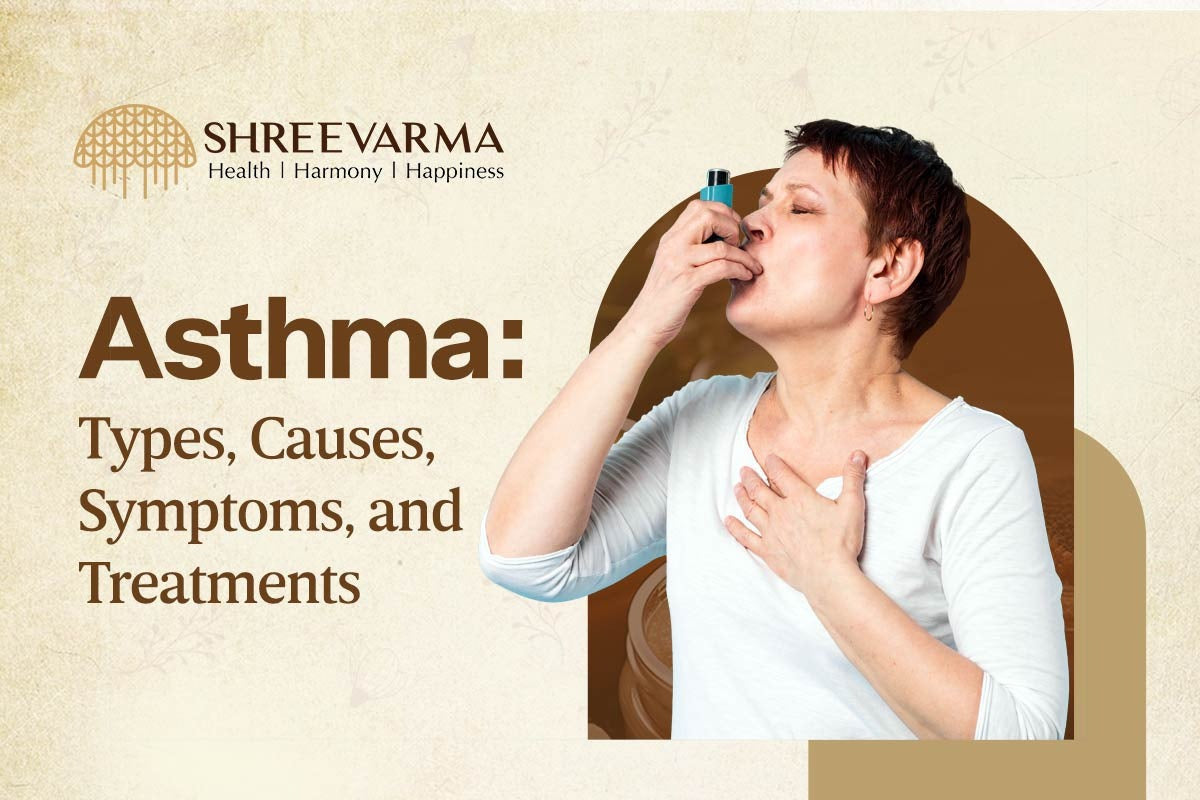Asthma is a chronic respiratory condition categorized by inflammation and narrowing of the airways, which leads to breathing difficulty and highly affects millions of people worldwide and directly impacts day-to-day activity. Through this blog, let’s understand about asthma’s types, symptoms and causes with a sole focus on what effective asthma treatment are available at the best ayurveda hospital for asthma in Chennai.
Types of Asthma
Asthma isn't a one-size-fits-all condition; it can manifest in colorful forms. Understanding these types is pivotal for effective operation and treatment.
- Antipathetic Asthma: touched off by allergens similar to pollen, dust diminutives, or pet dander. It's common among individuals with other antipathetic conditions.
- Exercise-Induced: Asthma Symptoms do occur during or after physical exertion. This type can indeed affect those who don't have asthma.
- Cough variant Asthma: The primary symptom is a patient cough, frequently without the typical gasping associated with asthma.
- Nocturnal Asthma: Symptoms worsen at night, dismembering sleep and leading to day fatigue.
- Occupational Asthma: It occurs due to the exposure to allergens in the plants or any other source.
- Eosinophilic Asthma: characterized through increased level of eosinophils (a kind of white blood cell) in both airways and bllods, it's a sign for severity.
- Steroid-Resistant Asthma: This type doesn't properly react to any standard corticosteroid treatments.
Causes of Asthma
The cause for asthma is still remain a mystery, but there are several reasons that directly or indirectly support's it's growth.
- Genetic Factors: If the family genetically have a history with asthma or disinclinations may create a strong reason to develop such condition.
- Environmental Trigger: Exposure to allergens (e.g., pollen, dust), annoyances (e.g., noise, pollution), and respiratory infections can spark asthma symptoms.
- Lifestyle factors: rotundity and lack of physical exertion can complicate asthma symptoms.
Symptoms of Asthma
Asthma symptoms can vary significantly among individuals and may include
- Shortness of breath
- Wheezing (a whistling sound when breathing)
- Chest miserliness or pain
- Persistent coughing, especially at night or during exercise
- Fatigue during physical activities.
Effective Asthma Treatment
While there's no cure for asthma, effective operation strategies live that can help control symptoms and ameliorate quality of life. Treatment generally involves a combination of specifics and life adaptations.
- Quick-relief Medications (Deliverance Inhalers)
- Short-acting beta-agonists (SABAs), such as Albuterol, give immediate relief by relaxing airway muscles.
- Long-term Control Medications
- Gobbled corticosteroids (e.g., Fluticasone) reduce inflammation in the airways.
- Leukotriene modifiers (e.g., montelukast) block substances that beget asthma symptoms.
- Long-acting beta-agonists (LABAs) are used alongside gobbled corticosteroids for better control.
- Biologic curatives
For severe cases, birth specifics target specific pathways involved in inflammation.
Life adaptations
- Avoiding Triggers: Relating and minimizing exposure to allergens and annoyances can significantly reduce symptoms.
- Regular Monitoring: Keeping track of symptoms and peak inflow readings helps manage the condition effectively.
- Education and Action Plans: Working with healthcare providers to develop an asthma action plan adapted to individual requirements is essential for effective operation.
Ayurveda for Asthma Treatment
For those seeking volition curatives, Ayurveda offers holistic approaches that balance the body’s powers. The best Ayurveda hospitals for asthma treatment in Chennai give substantiated care that may include
- Herbal remedies are aimed at reducing inflammation and strengthening lung function.
- Salutary variations to avoid mucus-forming foods.
- Breathing exercises (pranayama) that enhance lung capacity and promote relaxation.
Ayurvedic treatments emphasize forestallment through life changes and natural remedies acclimatized to individual constitutions.
Conclusion
Asthma is a complex condition that takes a multifaceted approach for effective operation. Understanding its types, causes, symptoms, and treatment options, including both conventional drugs and Ayurvedic practices, can empower individuals to take control of their health. For those considering Ayurvedic treatment options, seeking care at an estimable installation like the best ayurveda hospital for asthma in Chennai may give fresh support in managing this habitual condition effectively.






